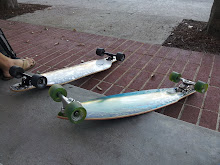Disco. The images this word conjures up for me include the shiny ball above the dance floor, Saturday Night Fever’s iconic image of John Travolta (a movie, I’m sad to say, I have yet to see), and big hair. Growing up in a Chinese household didn’t leave much room for cultural exploration outside that with which my parents were familiar. So, like in previous weeks, this is new territory for me. I actually thought disco took place during the 80s, which just shows how ignorant I am of pop music before the turn of the century... Echol’s brief description of the transition from the 60s to the 70s reminded me of a book I read a couple years ago called “Generation Me” by Jean Twenge, in which she talks about the current generation of people in their 20s and 30s who grew up with a focus on the individual rather than the collective, with the desire and drive to stand out, to be unique, being told from an early age that they’re “special.” Self-esteem became more important that productivity, and “A for effort” became the norm in schools. I wonder if this has anything to do with the cultural revolutions of the 60s, which brought out a consciousness of diversity and identity, civil consciousness which spoke to the importance of the individual, and resulted in a push for self-identification and standing up for oneself. Here is one interpretation that I do not necessarily agree with, but can (if I expand my mind enough) see the point -- my mom once told me that to come out of the closet (as gay or lesbian) is a very selfish move, as it is tragic to one’s parents. It is interesting to me that she speaks from a culture that is more collective (Chinese), whereas in America, hiding one’s sexuality in order to appease one’s family, save face, and keep peace within one’s communal society would be unfathomable in, well, the liberal, diverse circles in which I live. The continuity of disco on the dance floor is an interesting thought, especially since it seems to homogenize music - as Echols states, “songs that were easy to mix in and out of...began to dominate deejays’ playlists.” (Echols, pg. 9) Only certain songs that fit the beat and tempo of music were played and hence familiarized. Moreover, the embrace of the “synthetic over the organic, the cut-up over the whole, the producer of the artist, and the record over live performance” (Echols, pg. 10) resonates with the popularization of techno and electronic dance music today, as Echols mentions in her Epilogue. Electronic dance music seems to be the updated disco of today’s music world, even to the point of “discofying” popular songs into a style with techno beats and pounding synthesized percussion. Another interesting point to disco is that it seems to empower (at least economically in terms of visibility and record deals) marginalized minorities, especially black women, or the diva, with gay men as prominent consumers of this genre. Not to be grossly overgeneralizing, but the stereotype of the gay man as the diva suddenly makes more sense to me now... The point being is that it seems to me like one of the really significant things about disco was the fact that it is like a genre of subversion, a genre that was embraced by those in the margins - even the margins of the marginalized, as was the case of gay macho, and made the margins more visible than it were before. Echols makes the point that it crosses racial and gender boundaries that other genres may not. This probably says something about dance and rhythm as well... And just another thing I appreciated about this book - the historicizing and summarizing of gay culture in America.
Subscribe to:
Post Comments (Atom)




No comments:
Post a Comment